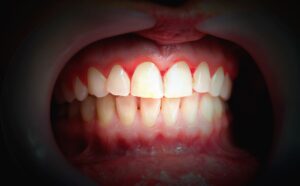Periodontal disease is an infection that affects the soft tissues of the gums. In its early stages, periodontal disease (or gum disease) will present as bleeding or inflamed gums. Your dentist will refer to this stage as gingivitis. As it advances, periodontal disease can cause missing teeth, bone deterioration, or other major health issues.

Causes of Periodontal Disease
One of the biggest contributors to gum disease is plaque. Plaque is a form of harmful bacteria that causes inflammation of the gum tissues. When you brush and floss your teeth, you remove plaque to keep your mouth healthy. If you don’t follow a good oral health routine, plaque will continue to build, eventually hardening into tartar.
As plaque builds along and underneath the gum line, the gums become irritated, causing them to recede. Gum recession leaves room for more plaque to build, creating a cycle of gum recession and plaque buildup. Unfortunately, the gums can recede from the root of the tooth, increasing the chances of tooth decay.
It is essential to treat gum disease as soon as possible. The earlier that you receive treatment, the more likely that you will avoid serious damage.
Treatment Options
Depending on the severity of your gum disease, your dentist can offer you several treatment options.
Antibiotics and Cleaning
Because gum disease is an infection, your dentist will likely recommend taking a round of antibiotics. This will help reduce or eliminate the infection. In addition, you will likely undergo a thorough dental cleaning. Removing the plaque and tartar buildup will reduce the inflammation. It will also help the antibiotics work more efficiently. If you still have any remaining infection, you will probably need another round of antibiotics.
Scaling and Root Planing
One type of treatment option is dental scaling and root planing. This is a form of intense dental cleaning that can help remove plaque. Using special dental tools, your dentist will scrape and break down any plaque or tartar buildup on your teeth. With their tools, they can even remove plaque from below your gum line.
After they remove the plaque, they will start the root planing process. Root planing helps to smooth the surface of the tooth’s root. This will make it harder for plaque to build on the surface of your teeth. Additionally, it will allow your gums to reattach to the tooth, minimizing gum recession.
Surgery
It is possible that you may need surgery if the gum disease is advanced. During the procedure, your dentist will make small incisions to gain access to the plaque buildup. They will create flaps that they will fold back to clean the area properly. Dentists may use traditional tools or lasers for this process. Once they clean and disinfect the gums, they will close the site to enable healing.
Periodontal Disease Effects
Without treatment, gum disease can damage your oral and overall health. Once the gums recede, your teeth can loosen, increasing the chances that they will fall out. Additionally, experts often link gum disease to heart disease. This is because the same plaque that builds under your gums can build in your arteries. Therefore, treatment is essential.
